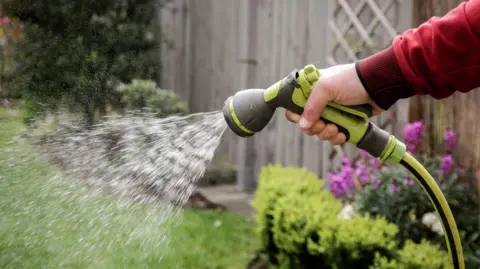Hosepipe ban in some areas amid water level concerns
 Getty Images
Getty ImagesA hose pipe ban has been introduced in Milford in County Donegal, Mullingar in County Westmeath, and Kells-Oldcastle in County Meath amid concerns over very low water levels.
The restrictions will apply from Tuesday and will last for six weeks.
Uisce Éireann (Irish Water) has said dry conditions stretching back to last autumn, through winter, and into spring have led to a sharp drop in water supply at key reservoirs.
Milford in County Donegal is supplied by Lough Colmcille. Both it and Lough Bane, which serves the Kells-Oldcastle area, are at historically low levels.
Lough Owel, which supplies Mullingar, is now at its lowest level for 50 years.
 Getty Images
Getty ImagesThe water conservation order bans the use of hose pipes for domestic and certain non-domestic uses, such as watering gardens outside businesses.
The organisation says this is aimed at preserving water for essential services.
'Dryer than normal'
"The past 12 months have been drier than normal when compared to the long-term average" according to Margaret Attridge, head of water operations.
"This means that some water sources which traditionally would have replenished over the winter period have not seen the same level of recovery."
"As a result, we are starting to experience issues with water availability at these sources," Ms Attridge said
Despite the targeted nature of the restrictions the utility has urged all households and businesses across Ireland to use water wisely as the country enters the summer months.
Earlier in 2025 Irish weather service, Met Éireann, reported that rainfall was below average at most weather stations in the Republic during winter.
The organisation also reported that autumn in 2024 was the 17th driest since records began in 1940.
Will there be a hosepipe ban in Northern Ireland?
In Northern Ireland, NI Water has said reservoirs are at a healthy position for the time of year despite experiencing a winter and spring with less than average rainfall.
"Rain in mid-April helped bring reservoir levels back up to 93% capacity" according to Water Supply Manager, Maynard Cousley.
"However, it is a timely reminder that our weather patterns are changing and we cannot take our water supply for granted.
"We must use our water supply wisely so we can conserve it for when we need it most."
Drought watch status
In a their April publication, the EU's Copernicus climate service has placed Northern Ireland and the Republic of Ireland into a drought warning status, moving from a drought watch status earlier in 2025.
This indicates low rainfall is now accompanied by declining soil-moisture levels and the first signs of vegetation stress, they said.
According to the UK Centre for Ecology and Hydrology, river flows in March ended the month "exceptionally low" across Northern Ireland.
